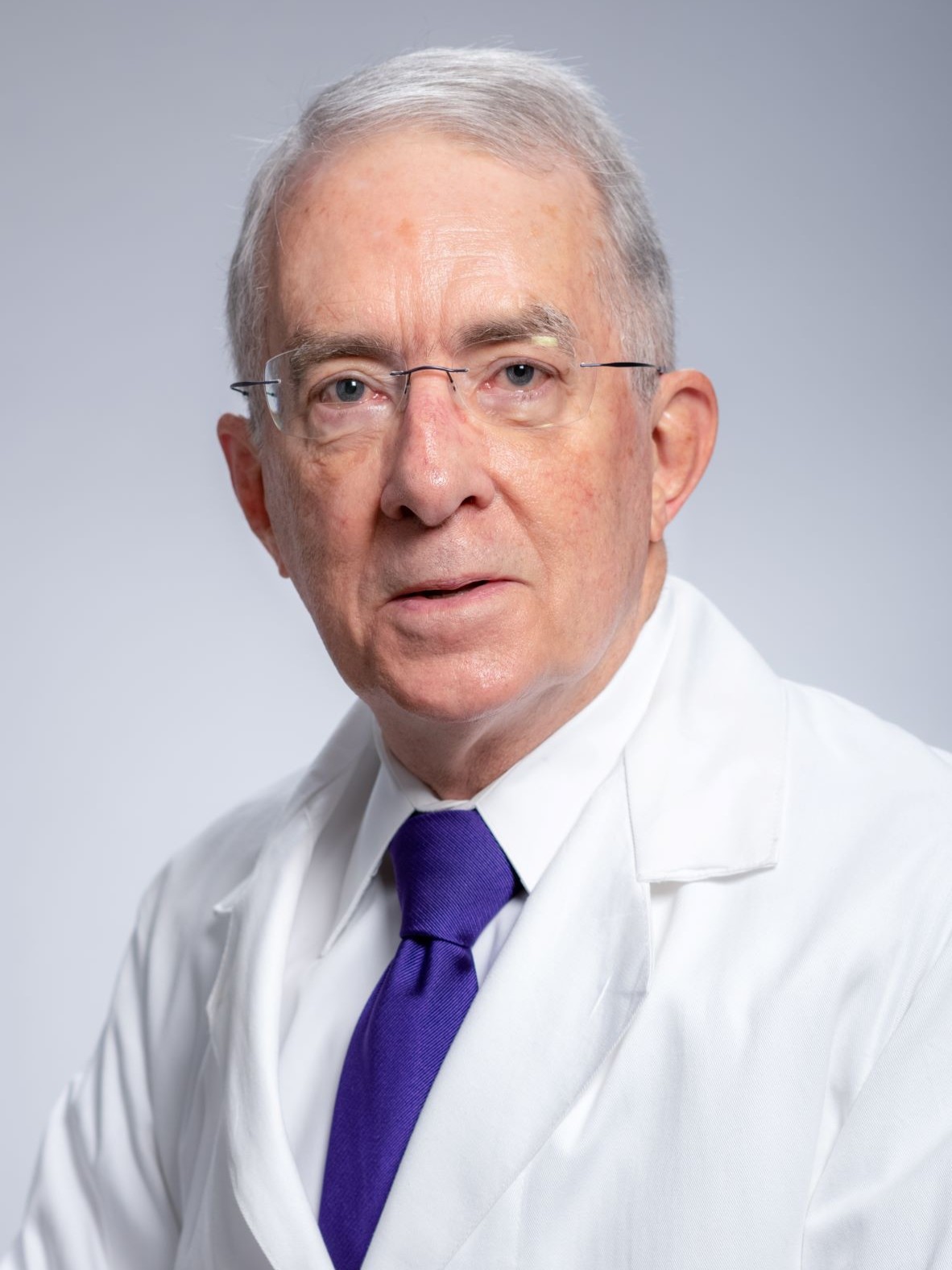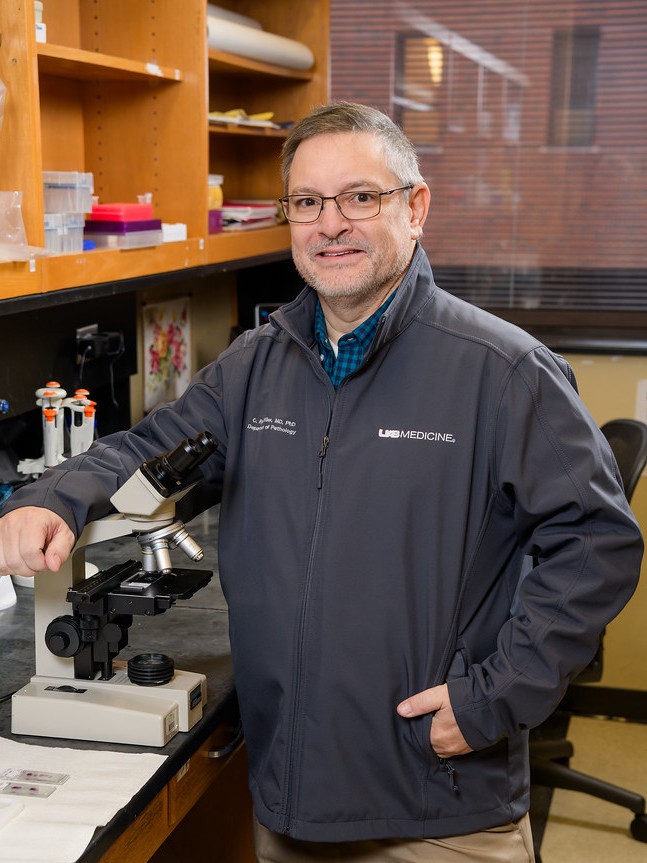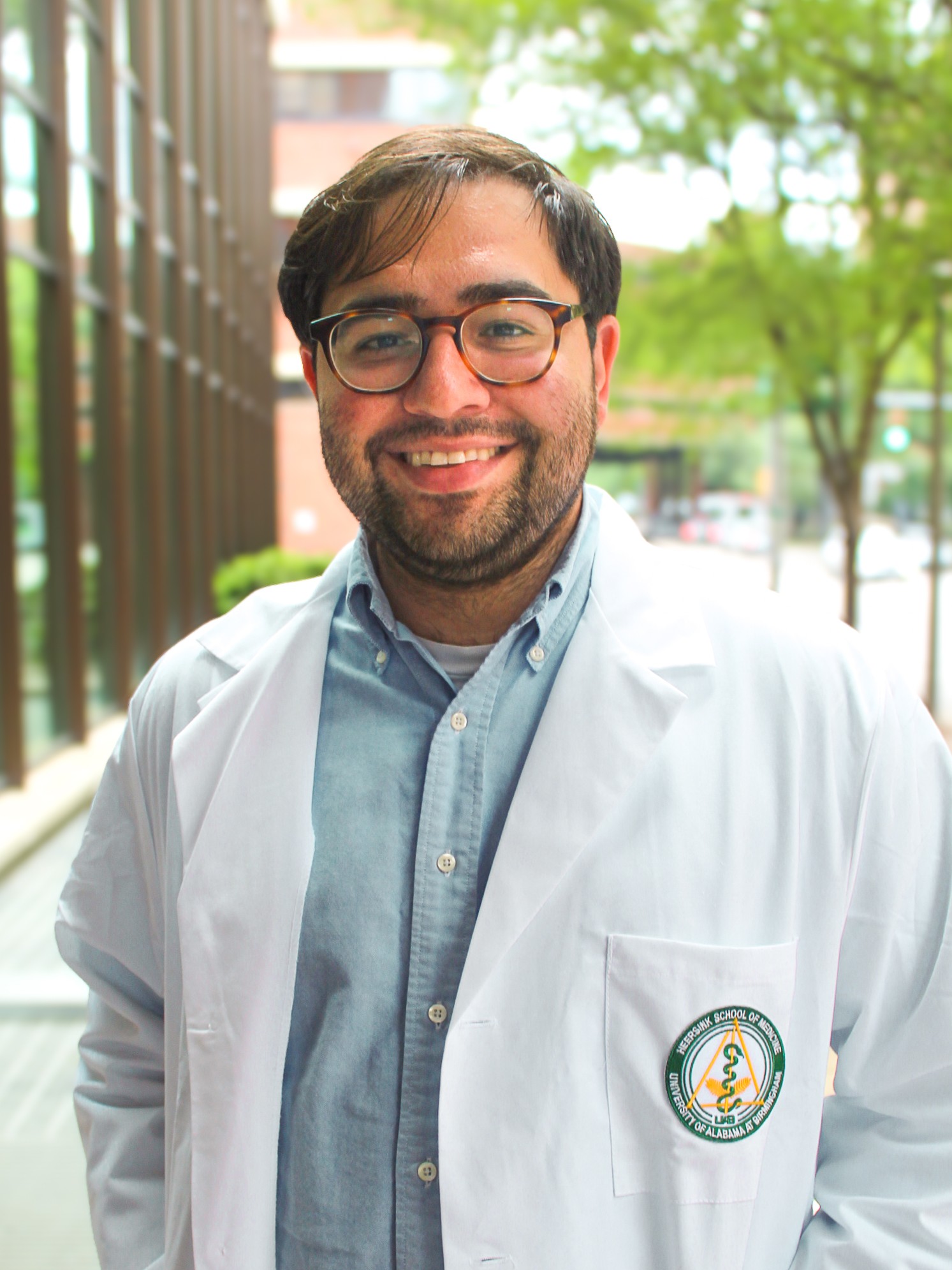The UAB Department of Pathology boasts a long legacy of fostering physician-scientists who are skilled both in clinical practice and research. These practitioners bridge the crucial gap between the lab and patient care, using clinical experience to drive research leading to new treatments and therapies. Their efforts target individualized medicine, propel public health breakthroughs and ensure that scientific discoveries are translated directly to the bedside.
In this inaugural series, physician-scientists from the Department of Pathology’s past, present and future will be highlighted to illustrate the unique career paths taken by individuals who trained both in clinical and research areas, and how doing so added value to their scientific journeys.
Past
 John Smith, M.D., Ph.D., an acclaimed member of the department, spent 27 years with UAB. During this time, Smith led the Division of Laboratory Medicine for 20 years. Smith passed away in 2021, yet his impact on the fields of pathology and chemistry are felt in the department today.
John Smith, M.D., Ph.D., an acclaimed member of the department, spent 27 years with UAB. During this time, Smith led the Division of Laboratory Medicine for 20 years. Smith passed away in 2021, yet his impact on the fields of pathology and chemistry are felt in the department today.
Smith’s physician-scientist training began at Purdue University in West Lafayette, Indiana, where he first earned an undergraduate degree in chemistry. He earned his Ph.D. in biochemistry from the University of Melbourne in Australia, then returned home to Missouri to earn his medical degree. Smith completed his residency training at Brigham and Women’s Hospital in Boston, Massachusetts. In addition to his training, Smith earned his Master of Science in Health Care Administration and Management from Tulane University in New Orleans, Louisiana.
Prior to joining the department, Smith was an associate professor of pathology at Harvard Medical School, associate pathologist at the Massachusetts General Hospital and an executive director at Autoimmune Diseases Research and Molecular Immunology and Merck & Company. Smith’s early research focused on the invention of solid-phase combinatorial chemistry, the elucidation of the molecular presentation of peptide antigens to helper T cells and the purification of important enzymes involved in protein processing.
Throughout his time at UAB, Smith held many leadership positions, including assistant chief of staff for UAB Hospital, UAB Faculty Senate Chair and UAB Faculty Representative for the University of Alabama Board of Trustees. His versatile training background allowed him to thrive in various roles throughout his career.
“Dr. John Smith was an extraordinary laboratory medicine physician, but perhaps his greatest contribution at UAB was the amazing mentoring and guidance he gave to junior faculty and residents,” said Vishnu Reddy, M.D., Wyatt and Susan Haskell Endowed Chair for Medical Excellence.
“An expert in clinical chemistry and peptide science, he was always curious to learn new technologies and had a great interest in informatics. He will be profoundly missed.”
Current
 Ryan Miller, M.D., Ph.D., Vishnu B. Reddy Translational Research Endowed Professor, Division Director of Neuropathology, joined the department’s faculty in 2019. Miller said that his decision to pursue physician-scientist training was the most practical thing for him.
Ryan Miller, M.D., Ph.D., Vishnu B. Reddy Translational Research Endowed Professor, Division Director of Neuropathology, joined the department’s faculty in 2019. Miller said that his decision to pursue physician-scientist training was the most practical thing for him.
“I wanted the depth of knowledge to be able to investigate questions that hadn't been answered before,” said Miller. “A medical degree would give me enhanced perspective on the important research questions.”
Prior to medical school, Miller completed a Ph.D. in the department’s Cellular and Molecular Pathology program at UAB in 1999. He earned his medical degree from the UAB School of Medicine in 2002 and completed his postdoctoral fellowship in the UAB Brain Treatment and Research program.
After completing his postdoctoral training, Miller trained at Washington University in St. Louis, Missouri, spending five years there for residency and fellowship training. He wanted his first faculty position to rely on his training in neuropathology but also give him the opportunity to develop as an independent scientist.
“I decided the best place for that was the University of North Carolina. UNC allowed me to transition from clinical to research,” said Miller. “It took me a while to get on my feet, but my training taught me to be resilient. I got my first R01 in 2016, and that changed the game.”
Since Miller joined the UAB Department of Pathology, he has earned two R01s. In 2022, he was awarded a $3.09 million R01 grant from the National Cancer Institute (NCI) to research next-generation human models to improve the development of drugs targeting glioblastoma, and in 2024, he was awarded a $2.5 million R01 to study therapeutic targeting in glioblastoma.
Today, Miller has fully transitioned to research and administration full time, making an impact on the scientific community through grants and publications. His research interests focus on developing personalized medicine-based molecular diagnostic tests, particularly of a drug response.
“To do this, we have to go beyond the descriptive work to the mechanism. For me, this could not be done without both degrees,” says Miller.
Future
 When Joshua Morse, M.D., Ph.D., was deciding what to study, he wanted to focus on the intersection of laboratory research and clinical practice.
When Joshua Morse, M.D., Ph.D., was deciding what to study, he wanted to focus on the intersection of laboratory research and clinical practice.
Dr. Morse, a PGY1 in the UAB Department of Pathology, earned his medical degree from The University of Texas Health Science Center at Houston in 2025. In the same year, he completed his Ph.D. in Therapeutics and Pharmacology at The University of Texas MD Anderson Cancer Center - UTHealth Houston Graduate School of Biomedical Sciences. Morse completed his dissertation on antibody-mediated cell death in subtypes of Acute Myelogenous Leukemia (AML).
"Joining the UAB Department of Pathology has enabled me to pursue my goal of combining translational science and clinical pathology training to develop novel pharmacogenomics techniques that predict how leukemia and lymphoma patients respond to antibody and cell therapies," Morse stated.
“I’ve always felt most at home in the lab, but I also wanted to have a clinical foundation on which to build informative biomedical research questions that could make a real difference in the lives of patients, like some of my own family members." Morse said. "Physician-scientist training was a perfect fit. I'm excited to continue this journey with the amazing resources and support of UAB Pathology."